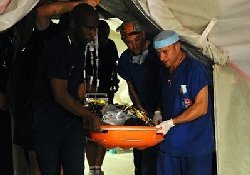French rescuers have pulled a teenage girl out of the rubble of a school in the Haitian capital, Port-au-Prince, 15 days after an earthquake devastated the city.
Darlene Etienne had just started studying at the school when the disaster struck.
She was said to be severely dehydrated with a weak pulse and rescuers rushed her to a French-run field hospital, before later transferring her to a hospital ship moored off Haiti for treatment.
It is unusual for anyone to survive more than three days without water, but Etienne may have had access to some water from a bathroom in the collapsed building and rescuers said she mumbled something about having a small amount of Coca-Cola with her in the rubble.
Neighbors had earlier alerted rescuers after they heard a weak voice calling from under the rubble.
On Tuesday, US troops pulled a man alive from under a collapsed building in the capital.
The 31-year-old man had a broken leg and was severely dehydrated, US authorities said.
The last previous rescue of someone trapped by the quake occurred Saturday, when a man was extricated from the ruins of a hotel grocery store.
'Delicate recovery'
Al Jazeera's Jonah Hull, reporting from Port-au-Prince, said that rescuers had faced "a delicate process" to pull Etienne from the rubble.
"It all happened very quickly, but rescue teams managed to get her out and she was covered in layers of dust and concrete."
Meanwhile, scenes of fighting have broken out in the Haitian capital as survivors continue to face severe food and water shortages two weeks after the earthquake devastated the Caribbean island.
On Tuesday outside the wrecked presidential palace, Brazilian UN peacekeeping troops fired tear gas at a crowd of thousands around a food-handout station.
"They're not violent, just desperate. They just want to eat," Brazilian army Colonel Fernando Soares said. "The problem is there is not enough food for everyone."
Facing persistent complaints by survivors that the huge amounts of aid flown in to Haiti is not reaching them on the ground, US and UN troops, as well as aid workers, have widened and intensified the distribution of food and water.
Al Jazeera's Sebstian Walker, reporting from the Haitian capital, said that there was still a bottleneck on the delivery of aid.
"Two weeks on, it is getting to be a desperate situation and people are nearing breaking point, as more fights are breaking out at food distribution points," he said.
However, despite some of the food handouts turning unruly, the UN said the overall security situation in the city remained stable.
"The vast majority of distributions in Haiti are being carried out in an orderly manner. There are isolated, regrettable incidents but these are the exceptions and not the rule," the World Food Program said.
Trauma
The UN food agency said it has delivered nearly 10 million meals to almost 450,000 people since the quake.
On Tuesday, a 4.4-magnitude aftershock shook the country, according to the US Geological Survey.
Haiti has been hit by more than 50 aftershocks since a 7.0-magnitude quake hit the country on January 12, each one bringing fresh trauma to survivors.
The aftershocks, lack of basic supplies and government offers of free transportation out of the battered capital have led to about 236,000 people leaving for the countryside since the quake, but the UN said the exodus has slowed to a trickle, with fewer than 1,000 leaving over the past day.
Alex Larsen, the health minister, said one million Haitians had been displaced from their homes in the wrecked capital and the authorities are trying to relocate at least 400,000 survivors from makeshift camps to temporary tent villages outside the city.
The government says it has tents for 400,000 to be used in the temporary settlements, but Rene Preval, Haiti's president, has asked the world to send 200,000 more before the rainy season starts in May.
PHOTO CAPTION
French medics carry a girl who was found alive in the rubble at the French hospital in Port-au-Prince.
Al-Jazeera


 Home
Home Discover Islam
Discover Islam Quran Recitations
Quran Recitations Lectures
Lectures
 Fatwa
Fatwa Articles
Articles Fiqh
Fiqh E-Books
E-Books Boys & Girls
Boys & Girls  Ramadan
Ramadan Fatwa Audios
Fatwa Audios Month of Mercy
Month of Mercy Women
Women Eed Al- Fitr
Eed Al- Fitr Food Recipes
Food Recipes Videos
Videos

 Prayer Times
Prayer Times












